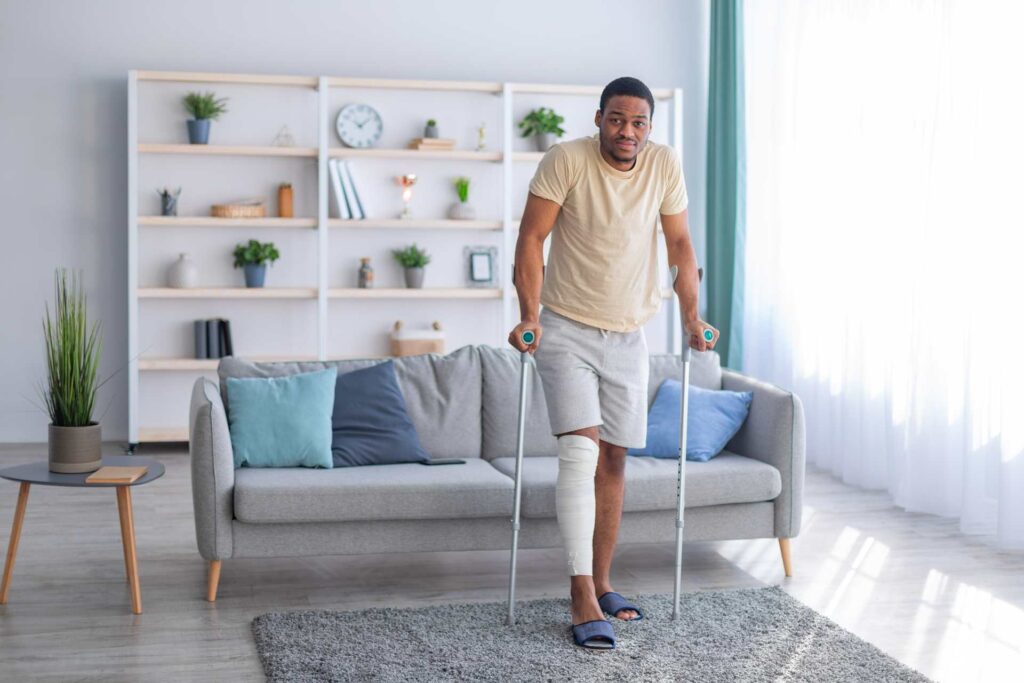Car accidents can be traumatic, both emotionally and physically. Sometimes, the adrenaline rush masks injury symptoms, leaving individuals unaware of the harm suffered. This blog explores how to handle injuries that don’t show immediate symptoms, ensuring you protect your health and legal rights.
Understanding Delayed Symptoms
After a car accident, the body’s immediate response can mask injury symptoms, thanks to the adrenaline and shock that naturally occur. This biological response is a double-edged sword—it can allow individuals to navigate potentially life-threatening situations immediately following an accident but also hides the true extent of injuries sustained. Delayed symptoms can emerge once the initial shock wears off, revealing injuries that were not apparent in the accident’s immediate aftermath.
Injuries with delayed symptoms can range from minor to severe. Understanding the physiological reason behind delayed symptoms is crucial. The body’s fight-or-flight response can prevent pain signals from reaching the brain, and some injuries, like internal bleeding or soft tissue damage, may not become symptomatic until inflammation or other complications develop.
Common Delayed Injuries
Delayed injuries can vary widely but often include:
- Whiplash: Typically associated with rear-end collisions, symptoms can appear several days after the accident.
- Concussions: Traumatic brain injuries might not be immediately evident, with symptoms like confusion, headaches, and dizziness appearing over time.
- Soft Tissue Injuries: Sprains, strains, and bruises might not show immediate symptoms but can lead to significant discomfort later.
- Psychological Impacts: PTSD, anxiety, and depression can develop well after the physical injuries have healed.
Recognizing these injuries early can be crucial for your recovery process, emphasizing the importance of monitoring your health closely after an accident.
Immediate Steps to Take After an Accident
In the immediate aftermath of a car accident, taking the right steps can significantly impact your health, legal rights, and potential compensation. Even if you walk away feeling unscathed, the reality is that injuries from car accidents often have delayed symptoms, making it crucial to act with foresight and diligence. This section outlines the immediate actions you should take following an accident, emphasizing the importance of medical evaluations and thorough documentation. These initial steps are foundational in safeguarding your well-being and ensuring that any future claims or legal actions are supported by solid evidence. By prioritizing your health and gathering all necessary information from the start, you can navigate the post-accident process more smoothly and effectively.
Seek Medical Attention
Immediate medical evaluation is crucial, even if you feel fine. A healthcare professional can conduct a thorough examination to identify any injuries that may not yet be symptomatic. This early intervention is not only vital for your health but also establishes a medical record of the accident, which can be crucial for insurance and legal purposes.
Document Everything
Documenting every detail about the accident and your health in the following days and weeks is essential. This documentation should include:
- The accident’s details: time, location, how it happened.
- Any symptoms that develop, no matter how minor they seem.
- Medical evaluations and treatments received.
This information can be invaluable for insurance claims and legal processes, providing a timeline that links your injuries directly to the accident.
Navigating the Aftermath
The period following a car accident is critical for both your physical recovery and the management of any ensuing legal and insurance matters. This phase demands vigilance in monitoring your health for delayed symptoms, which can emerge subtly and gradually worsen over time. Equally, navigating the complexities of insurance claims requires a strategic approach, especially when the full extent of your injuries might not be immediately evident. This section delves into the essential practices of health monitoring and effective communication with insurance providers, laying out a roadmap for handling the aftermath of an accident with the utmost care and attention to detail.
Monitoring Your Health
In the weeks following an accident, it’s important to monitor your health for any changes or delayed symptoms. Keep a detailed journal of your physical and emotional state, noting anything out of the ordinary. If new symptoms arise, seek medical attention immediately. This proactive approach ensures that any developing injuries are treated promptly and documented accurately.
Dealing with Insurance
Interactions with insurance companies post-accident can often feel like navigating a minefield, particularly when the injuries sustained do not manifest immediately. The key to effective communication lies in the meticulous documentation of every aspect of the accident and its aftermath, including medical evaluations and any symptoms that develop. Rushing to settle claims can be a pitfall, as some injuries take time to reveal their full impact. In such scenarios, the guidance of a legal professional can be invaluable, ensuring that your rights are upheld and that the compensation received is commensurate with the injuries sustained and their long-term implications.
Its crucial to:
- Provide detailed documentation of the accident and subsequent medical evaluations.
- Avoid settling your claim too quickly, as some injuries may not have fully manifested.
- Consider consulting with a legal professional to ensure your rights are protected and you receive fair compensation.
Legal Considerations
Navigating the legal landscape after a car accident, particularly when injuries are not immediately apparent, can be a complex and daunting task. This complexity underscores the importance of considering legal advice as part of your post-accident action plan. Legal considerations become especially crucial when delayed symptoms arise or when there are disputes regarding the accident’s circumstances. A knowledgeable personal injury lawyer can be an invaluable ally, offering expert guidance through the claims process, advising on interactions with insurance companies, and providing robust representation in court if necessary. Moreover, building a compelling case requires meticulous documentation and evidence collection, which a legal professional can help manage effectively. This section delves into the critical steps of when and why to consult a lawyer and how to methodically compile the evidence needed to build a strong case, ensuring your rights are protected and you are positioned to receive the compensation you deserve.
When to Consult a Lawyer
Consulting with a personal injury lawyer can be beneficial, especially if your injuries develop symptoms later or if there’s a dispute about the accident’s circumstances. A personal injury lawyer at Rebecca Kay Sapp Law Firm can provide:
- Guidance on navigating the claims process.
- Advice on dealing with insurance companies.
- Representation if your case goes to court.
Building Your Case
If pursuing legal action, compiling a comprehensive evidence package is essential. This package should include:
- Medical records and bills.
- Documentation of any lost wages.
- A diary of symptoms and how they’ve impacted your life.
- Any correspondence with insurance companies.
A strong case is built on clear, documented evidence linking your injuries to the accident, highlighting the importance of detailed record-keeping from the moment the accident occurs.

Long-Term Care and Recovery
The journey to recovery after a car accident extends beyond the initial medical treatment and encompasses a comprehensive approach to long-term care and rehabilitation. This phase is crucial for addressing both the physical and psychological impacts of the accident, ensuring a holistic recovery. Whether it’s regaining physical capabilities that were compromised or navigating the emotional toll such incidents invariably exact, the path to full recovery often involves a multidisciplinary approach. Early access to rehabilitation services, including physical and occupational therapy, plays a pivotal role in enhancing your recovery prospects, helping you regain strength, movement, and the ability to return to daily activities. Equally important is addressing the psychological aftermath of the accident, which can be as challenging as the physical injuries. Mental health support, through therapy, counseling, and support groups, is essential in coping with anxiety, depression, or PTSD.
Rehabilitation and Therapy
For many, the recovery process involves rehabilitation and therapy. Accessing these services early can significantly improve your recovery prospects. Rehabilitation may include:
- Physical therapy to restore movement and strength.
- Occupational therapy to help return to daily activities.
- Counseling to address the psychological impact of the accident.
Mental Health Support
The psychological aftermath of a car accident can be as debilitating as physical injuries. Seeking mental health support is crucial for a holistic recovery. This support can include therapy, counseling, and support groups, providing the tools to cope with anxiety, depression, or PTSD that may develop.
Conclusion
Dealing with car accident injuries that don’t show immediate symptoms requires vigilance, proactive steps, and patience. By understanding the potential for delayed symptoms, seeking medical attention early, meticulously documenting every detail, and knowing your legal rights, you can navigate the aftermath of a car accident more effectively. This comprehensive approach ensures that both your health and legal interests are protected, paving the way for a thorough recovery.

